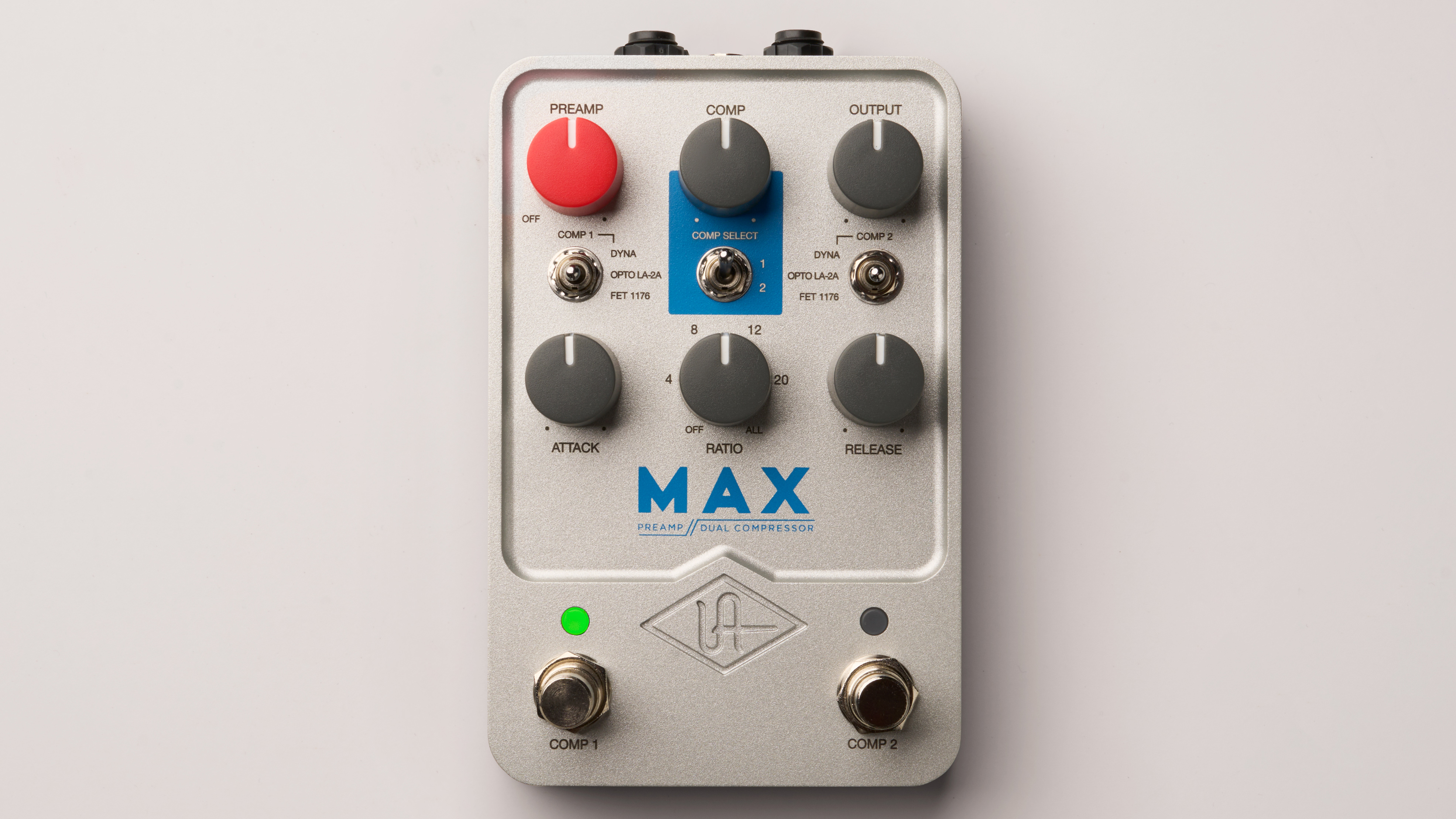
Universal Audio UAFX Max Preamp & Dual Compressor: What is it?
Does any effect confuse, delight and bemuse guitarists like compressor pedals? For some a good compression box can be an always-on effect – something that makes everything just sound better. For others, they seem like the dullest, most inconsequential pedal they could possibly spend money on. Plenty of us don't know what they actually do (this can help with that). And dual compression? Don't even get us started!
But whether on a pedalboard or in the studio, compression matters, and the popularity of Keeley's four-knob model and premium pedals like the Origin Effects Cali76 series tells us more than enough guitar and bass players agree to prompt UA in adding it to its ever-growing UAFX line. And it's going big; models of three classic compressors, along with its own popular preamp, that can be stacked and run in series and parallel options. A one-stop recording and stage solution for your needs? A perfect pedal for dialling in for two different guitars? $375 and 400mA of current draw overspec'd overkill?
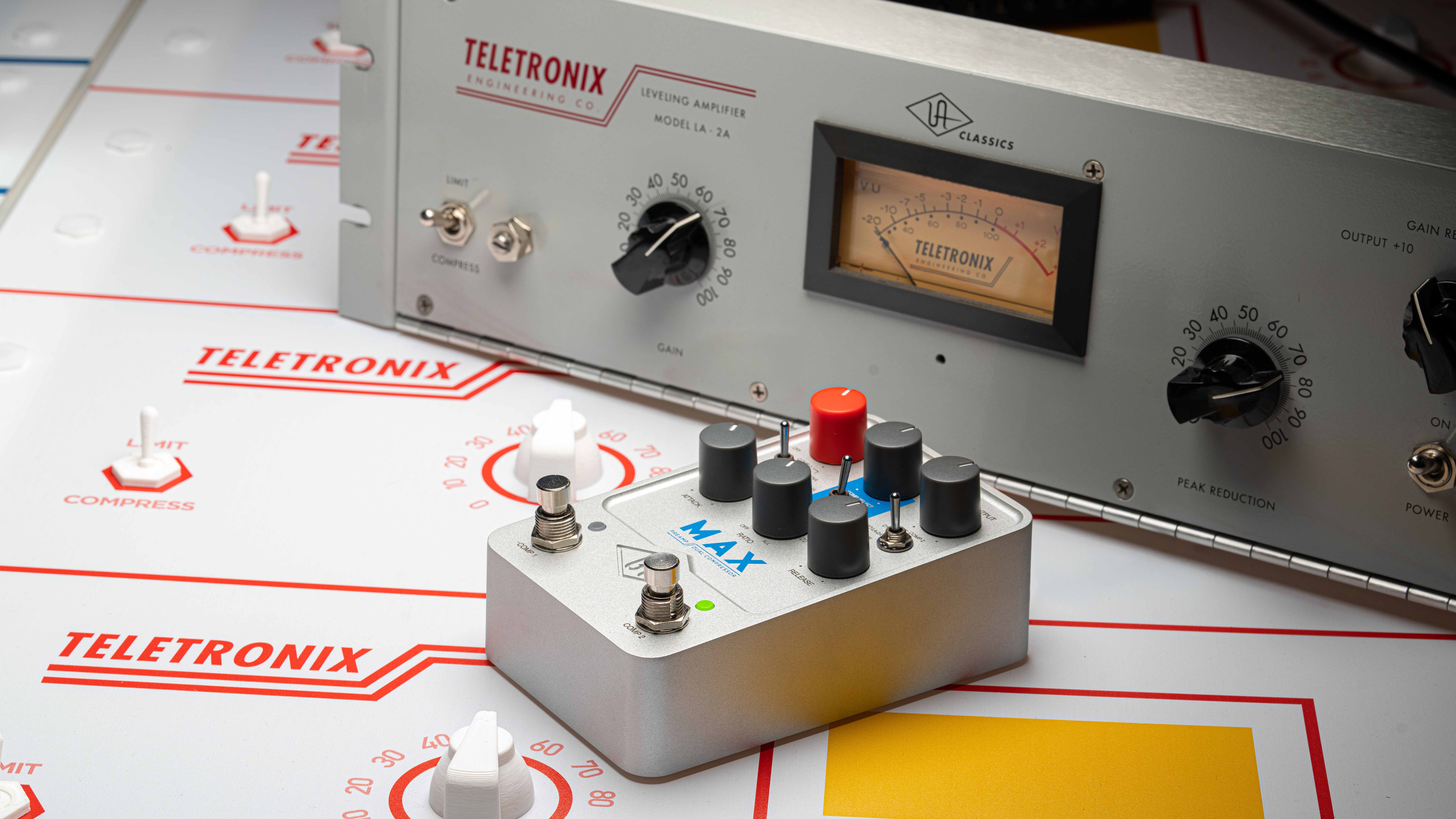
The Max offers digital emulations of the two most popular vintage compressors around with the tube-driven Teletronix LA-2A and solid-state FET-based 1176 Peak Limiter designed by original UA founder Bill Putman Sr and produced in 1976. UA has already made successful and popular plugins based on both to bring to this pedal, so if anyone has bragging rights and the expertise on modelling these units for your 'board it's UA. Indeed, these plugins have proved so popular that we wonder why it's taken this long for compression to appear in the UAFX line.
The third compressor model here is based on the MXR Dyna Comp pedal. While the vintage units can be used subtly for an always-on effect, the Dyna is a squashier, more aggressive affair traditionally – think country chicken pickin' guitar and long sustain you can really hear.
Added into the mix is a preamp based on UA's 610 tube preamp, itself derived from another piece of Putman engineering magic from the '60s; the LA-610 console module used on countless records. Origin Effects recently made this the focus of its own $319 DCX Boost. Here there's the prospect of it being part of a much bigger package.
Because while some premium compressor pedals, and racks, have chased the LA-2A and 1176 separately, here they're brought together in a pedal where you can place them on either side. And the 610 adds the attraction of it becoming, in effect, UA's first drive pedal to that combo. Something that can be part of your gain stacking in the pedal itself and with other overdrives, as well as enhancing your clean tones.
For some this plugin selection in a pedal will be enough to justify the asking price here, because we already know how well UA has recreated these units. But others will be asking why they would want multiple compression options and a preamp going into your guitar signal chain. There's no XLR input here, in case you were wondering if UA might be trying to attract vocalists too. But there's nothing stopping someone from using a dynamic mic via an XLR-to-1/4" jack converter. In this review, we're focussing on the intended guitar market.
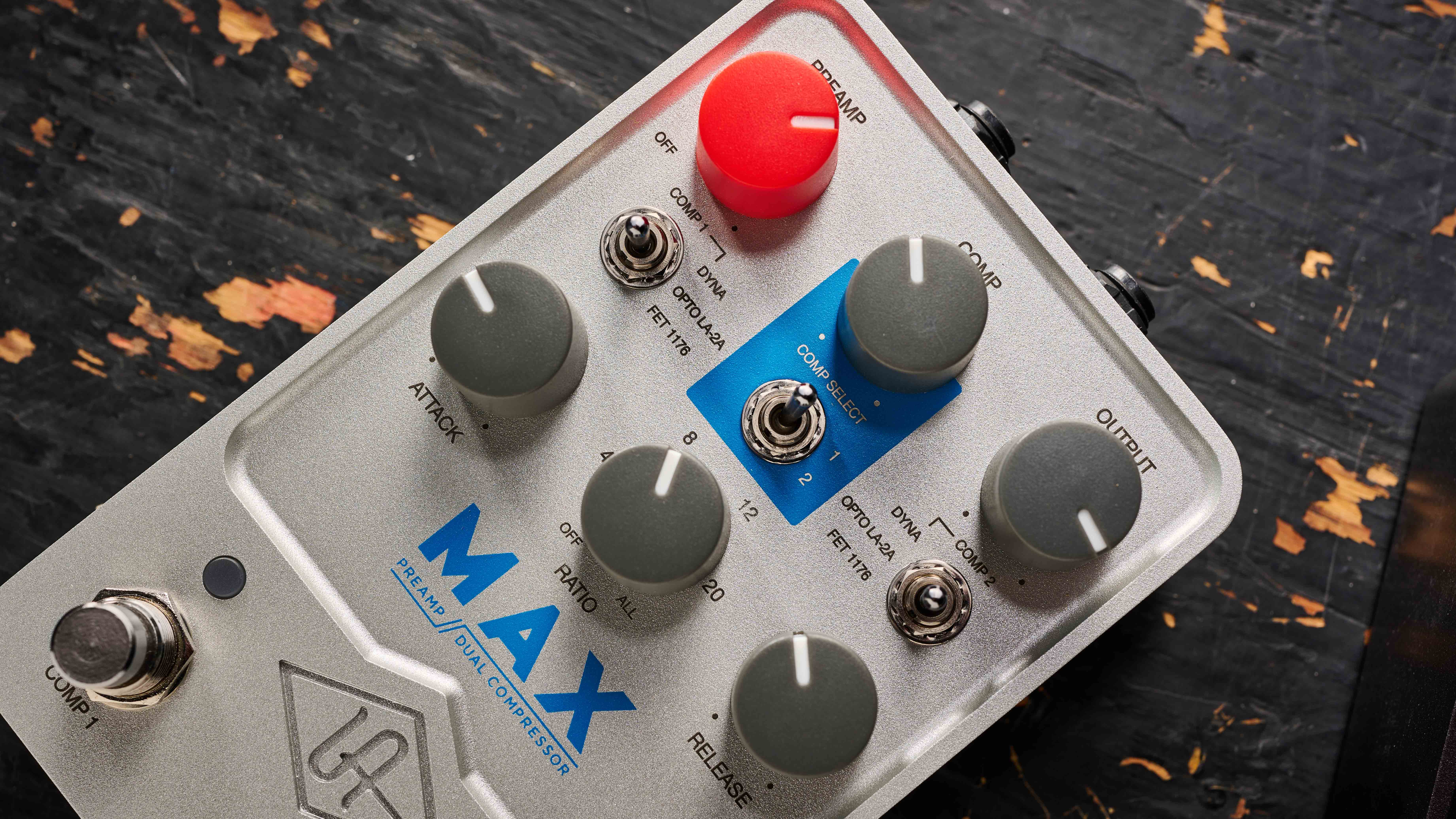
Universal Audio UAFX Max Preamp & Dual Compressor: Performance and verdict
With the UAFX pedal format of six knobs, 2-3 mini toggle switches and two footswitches remaining rigid so far, it turns out the Max is well suited to it – probably the best example so far for ease of use in its hardware, next to the Dream '65 amp emulator, Starlight Echo Station and Golden Reverberator. Compression 1 and 2 are assigned to each footswitch, the red knob is the preamp and two mini toggles switch between compression models. Another then selects the model you're dialling in parameters for.
It's very much a hands-on hardware affair that quickly makes sense, and with two compressions, each with their own settings, the preset issues (namely lack of them) that undermined the Galaxy '74 tape echo and reverb's usability for me aren't really an issue here. How many compression presets do you really need at the flick of a switch?
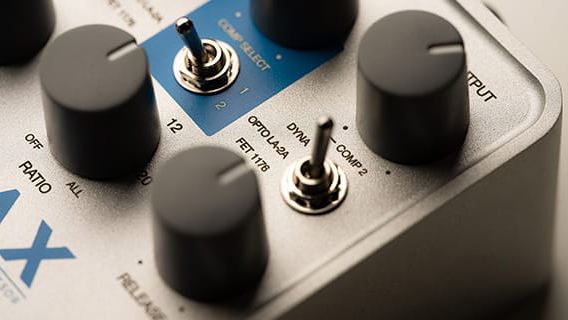
While the Dyna Comp is very much still a compressor suited to single-coil pickups, both the clarity of the 1176 and smoother LA2A can be used for great always-on, tone enhancers
While the MXR Dyna Comp was one of the big successes of early compressor pedals designed to go into the front of a guitar amp, the LA2A and 1176 were not designed for that purpose, being studio-based hardware aimed at mic processing. Origin has already proved how persuasive the 1176-influence can be in its analogue Cali76 compressors, and this is where digital modelling can shift the influence of the past to new areas by putting multiple emulations of this vintage tech in a pedal for a new usage scenario.
While the Dyna Comp is very much still a compressor suited to single-coil pickups, both the clarity of the 1176 and smoother LA2A can be used for great always-on, tone enhancers. The increase in noise-floor associated with compressors in your signal chain is still in evidence when pushed, especially when stacked. But one of the Max Compressor's greatest strengths is the options available.
Before I could explore this potential I had some obstacles to overcome. Once again as an Android user with a Pixel 7 Pro and the latest version of Android 13 at the time of review, I experienced issues connecting to the Max to register and access its additional routing options through the Bluetooth UAFX Control app. An old iPad Mini 2 had no issues. It's also important to check your UAFX pedal has the latest firmware as the first port of call – and this is done via the UAFX Control desktop app.
Now, we acknowledge all users' experiences will be different but at this point, it seems obvious to us that users should be given the option to access the pedal's expanded controls through the desktop app as well as the app that is completely reliant on Bluetooth connectivity to access core features. And we'd really like to see UA do this in future updates.
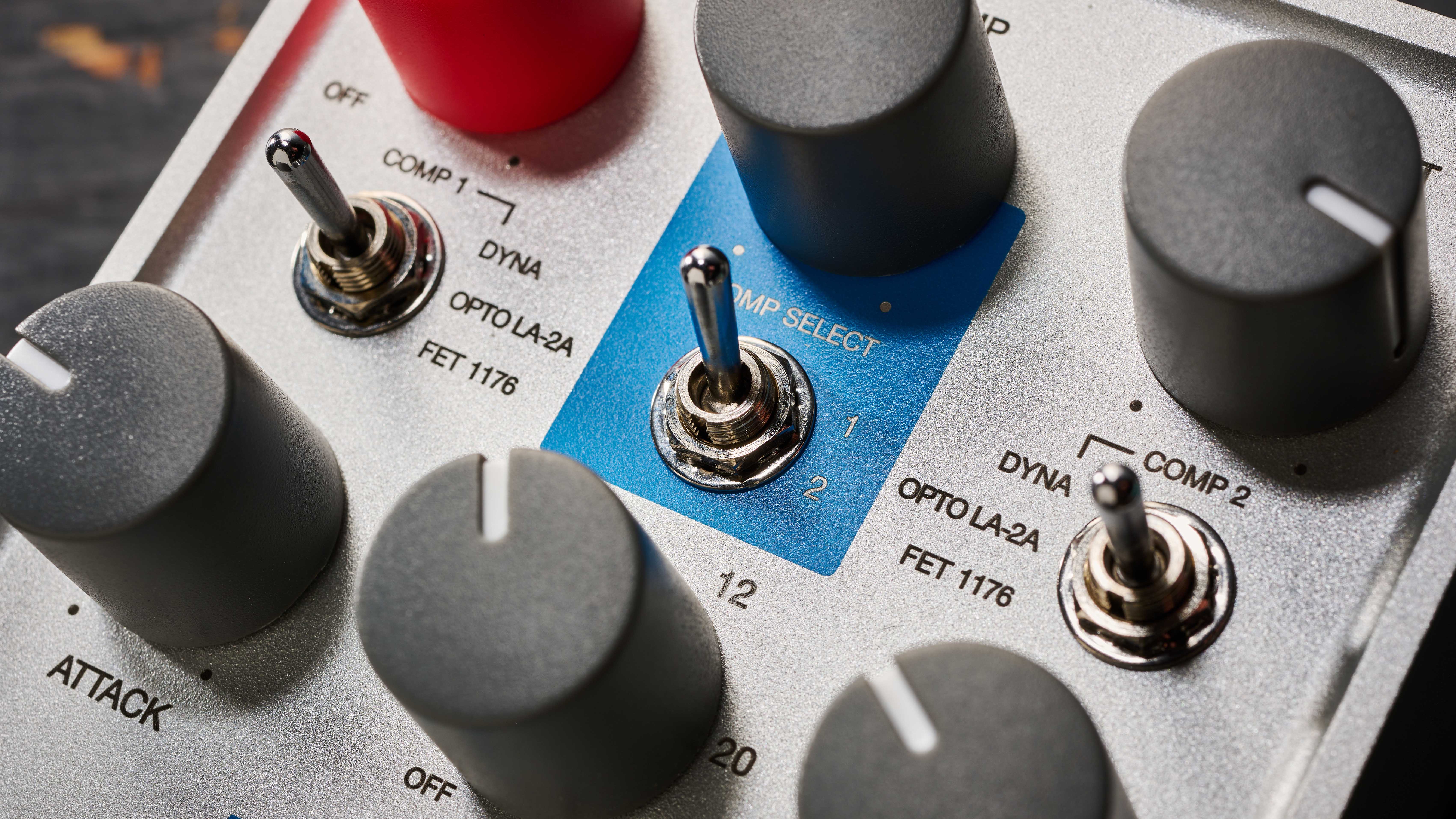
In addition to running two compressor models in Series (compressor 1 feeds into compressor 2) or Parallel (input goes into each compressor separately with a combination created at the output), and individually in Exclusive mode (only one compressor can be activated at any one time) for dialling in settings for two different guitars or compression requirements, it seems at first that UA has overlooked a couple of things. The first is being able to run a parallel setup to blend a dry signal with one compressor. But this is actually possible, because of the way the Parallel mode work – it's just not blatantly signposted in the options.
Choose to run the pedal in 'parallel' mode in the Control app and set one model's compression parameter to zero and there you have it.
Another missing routing path is the option to use two compressors individually; such as placing one compressor model before and after an effects loop, or one for guitar input and another for a mic. However, UA is reportedly planning to add a Dual Mono mode in a future update, which is very good news for the pedal's future flexibility.
Out of the box, there's still a lot of potential to explore if you are a player that sees the appeal in multiple compressor options. The preamp's emulated tube saturation really adds avenues here in terms of setup scope in your gain palette; for example, a compressor for clean and another set up for some warm but gritty overdrive. Though you'll have to use the Control app for EQ changes to it.
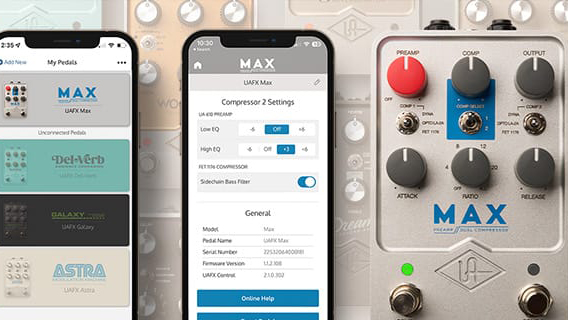
The app allows low and high EQ adjustments for the 610 preamps applied to each of the two compressors chosen, as well as an option sidechain bass filter for the FET 1176 to remove some low frequency if required. And on the hardware, the five-stage ratio control options (the higher the Ratio the more frequency squash) extend to the LA2A – going far beyond the original unit's two (so too with the Release control for it here with 12 o'clock reflecting an LA2A's release speed). The Ratio, Attack and Release settings have no effect on the DYNA model, in a more authentic reflection of the MXR pedal's streamlined OupPut and Sensitivity controls.
And in all these multiple compression options lies the fork in the road; how many players want or need a compressor to do all this, especially when some aren't sold on adding just one compressor to their pedalboard? The Max isn't for everyone, but it doesn't need or set out to be. It presents a combination that isn't available anywhere else.
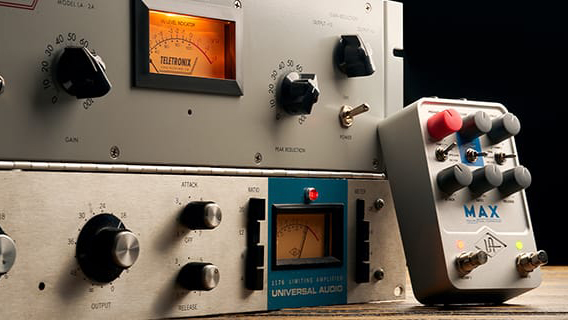
And as far as pricing goes, highly-rated analogue compression pedals from Origin Effects and Effectrode (PC2A) that seek to recreate the two big draws of this pedal with the 1176 and the LA-2A cost up to £279 each – and without the ability to combine them with the different routing options and preamp that the Max represents. In this light and even considering the digital proposition, the asking price here isn't unreasonable for the high-quality results, though the 400mA power draw might require a rethink with your pedal power supply.
MusicRadar verdict: This isn't a pedal for casual compressor users but it offers authentic recreations of some classic studio hardware together for the first time in one stompbox, with enough options for using them that could be great for multi-guitar and gain-staging needs on your pedalboard.
Universal Audio UAFX Max Preamp & Dual Compressor: What the web says
"There’s really nothing to dislike about this pedal; the only issue is that, for most guitar players, it’s colossally over-specced. When many of us don’t even have a compressor on our board, who really needs one with switchable circuits, stereo outputs and app control? The Max would surely have made more sense as a smaller, simpler, more affordable unit with the same three algorithms in a single mono circuit – if only the UAFX design template were flexible enough for that to be possible."
Guitar.com
Universal Audio UAFX Max Preamp & Dual Compressor: Hands-on demos
Worship Tutorials
Corey Congilio
Vintage King
Reverb
Universal Audio UAFX Max Preamp & Dual Compressor: Specifications
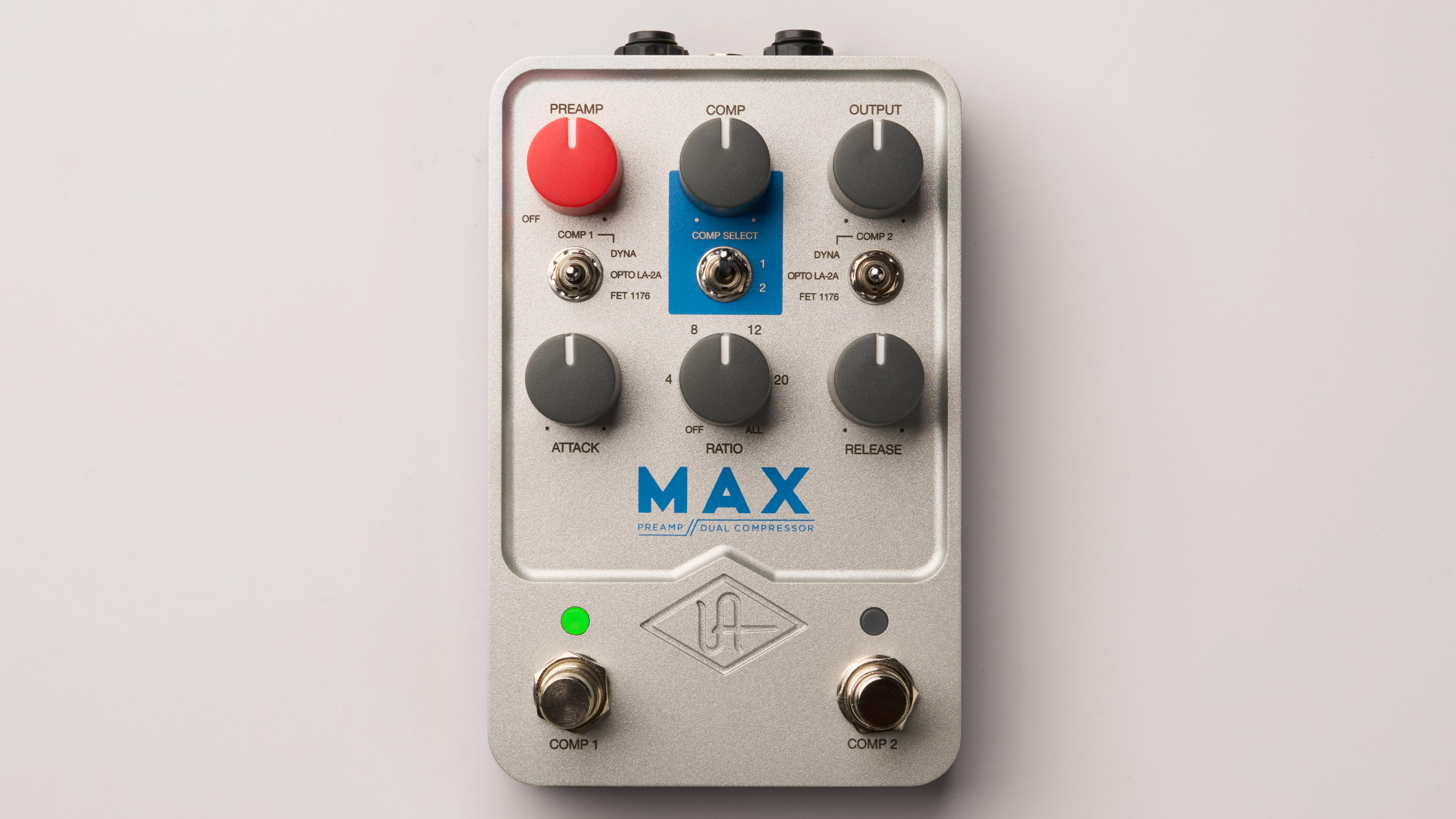
- TYPE: Digital compression pedal and premp
- ORIGIN: Designed in the USA, made in Malaysia
- CONTROLS: Preamp gain, Compression, Output, Attack, Release, Ratio, compression model mini toggles 1 and 2, Compression select for parameter editing; ; Comp 1 and 2 bypass footswitches
- FEATURES: Mono / stereo inputs and outputs, USB-C input for firmware updates via UAFX Control desktop app, Bluetooth connectivity to UAFX Control mobile app
- BYPASS: Buffered
- POWER: 9V centre-negative power supply (400mA minimum draw, power supply not included)
- CONTACT: Universal Audio







